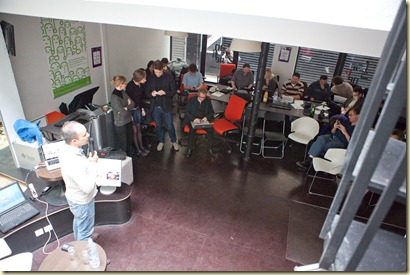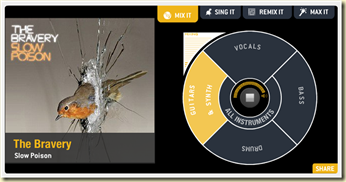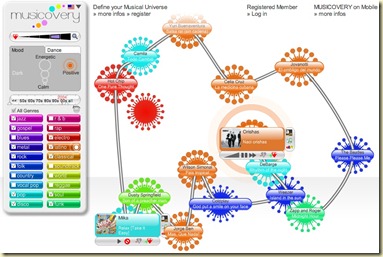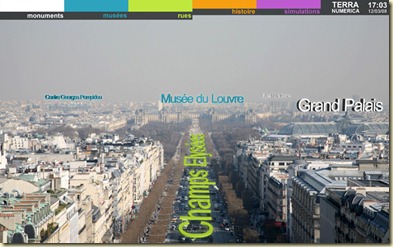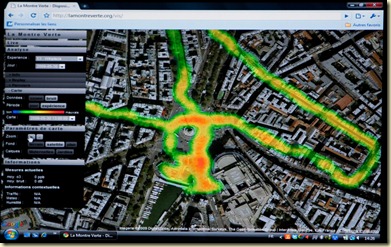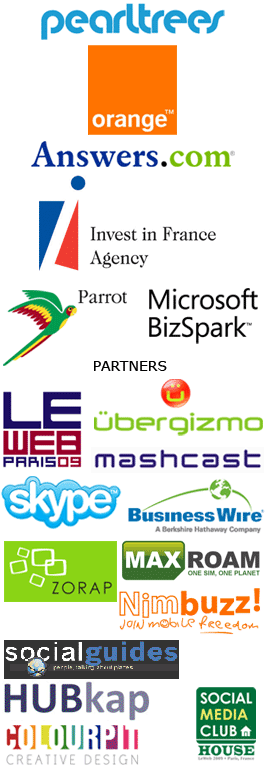With the Traveling Geeks @ La Cantine
by Olivier Ezratty on December 13, 2009 at 4:32 am
This second part of my report from the Traveling Geeks tour in Paris is focused on the companies we visited during the first two days, Monday 7th and Tuesday 8th of December 2009. With startups with short presentations, startups with long meetings, then larger companies (Orange, Parrot).
I’ll start here with the startups we met at La Cantine. I realize I’ll need more posts for the rest of this two days visits.
We met companies at La Cantine (@lacantine) which were pre-selected by Cap Digital (@Cap_Digital), a Paris area Digital Media cluster. France created clusters back in 2005 against a model that works more or less in many European countries. There’s always a willingness to recreate some of the magic that exists in the Silicon Valley. But everybody knows that the alchemy of the Valley is way more complex and dates back from a while (creation of Stanford University, the history of the chip makers, etc).
Creating clusters is a way to reach a critical mass of startups, research labs and large companies organized by industry sector. Government and local government provide some infrastructure and significant subsidies. It’s encouraging collaborative projects. The typical subsidized project gathers a couple startups, one or two public research labs and one large company. There are 71 clusters in France, which is way too much. But funding and companies are hopefully concentrated on the top 10 clusters. And there are 5 ICT (information & communications technologies) clusters in the top 6.
Back to the TGs, the meeting took place at La Cantine, a Paris location put in place in 2008 where all sorts of ICT meetings take place. There, entrepreneurs can meet on the go, open source communities meeting can take place as well as BarCamps and the likes. Corporations like Orange, Sun or Microsoft also use it for some of their launches.
At La Cantine, we met traditional startups like MXP4 and Musicovery, and a bunch of not-for-profit organizations or startups working on open source projects and/or for local governments. While many of them had a local impact, they are still providing interesting ideas to expand worldwide.
- MXP4 (@TheRemixCulture) who provide a web software solution to listen to music with remixing it and selecting the instruments you want. Kind of a multi-track mixing music at your fingertips. Demo was done with “I want you back” from Michael Jackson, which was impressive, particularly given the company has a strong partnership with Motown to promote MJ’s catalog. The UI is quite simple to handle. You can also display song lyrics, share your mixes on Facebook. It’s a good way to rejuvenate back music catalogs. One of the founders of MXP4 is Gilles Babinet, who created Musiwave, sold to OpenWave and then to Microsoft. The project started in 2006. Artists “signed” include Britney Spears, David Guetta, MJ, Pet Shop Boys and Pink. Their business model is to license their software technology to content rights owners although it’s been free as a start for bands and record companies like Motown. They compete with companies like mixmatchmusic. All in all, a startup well positioned in the global market.
- Musicovery provides a web based music player or DJ using a “mood matrix” ring where you can define the kind of music you want to listen (calm to energetic, music you can dance, tempo, year/decade, music type, etc). The site was identified a one of the Top 50 web sites to watch by Time. The site generates 1 million uv/mo, has 600K registered users, with its first audiences in the USA and Latin countries. France accounts for only 20% of their audience. The TG folks pointed out a risk of a lawsuit from the records industry. They’re working on it with the help of Cap Digital.
- Terra Numerica is a research lab of 15 people based out of a cluster of 17 Paris university labs working on virtual and augmented reality solutions for cities. They work on collaborative projects and create consortium on an ad-hoc basis. They did show us videos of two interesting prototypes: a virtual telescope for city panoramas tested at the Arc de Triomphe which adds information on top of the visualized panorama and an impressive high-resolution 3D virtual version of Paris in which you can navigate. A much better experience than any “Street View” solution!
- Green Watch is a project to multiply the number of environmental sensors in cities. It measures the quality of the air (Ozone levels) and noise (dB). It contains a GPS and Bluetooth connection to transmit the collected information to a nearby mobile. 15 prototypes have been built so far. They’ve been partnering with SFR, the second mobile operator in France. The prototypes have been tested at La Bastille in Paris and also in Amsterdam, which enabled the creation of the map below with hot colors showing polluted areas.
- Feedbooks (@Hadrien) is a web site publishing public domain books for reading them on mobiles. The cloud service is able to reformat books for any kind of screen. They also create PDFs for mobiles out of RSS news feeds.
- XWiki Enterprise is an open source project to run enterprise wikis. There are many believers in the open source model here in France. While it’s popular everywhere including in the USA, those project’s business models are mostly based on IT services and are not very scaleable. Thus, besides a couple exceptions, these projects remain rather local.
- Bearstech, a service company for hosting open source based solutions. Wasn’t here during their talk.


